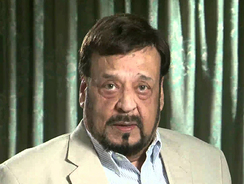
NEW DELHI - Actor Ravi Khanna, who essayed the role of the ISI boss who frames Salman Khan's character as an Indian spy in "Bajrangi Bhaijaan", says there's a vacuum for an onscreen villain in Bollywood, and feels he can fill it with his authoritative voice and effective screen presence. "Bajrangi Bhaijaan" reconnected Khanna with Bollywood, who, after 33 years in the US, had moved last year to Mumbai. Now he is exploring...

new roles, while also working on a book titled "Indian Antagonist", in which he traces the history of the Bollywood villain. "It's the villain that interests me, and there is a vacuum in that space. With my voice and screen presence, I could be in roles like Amrish Puri did. Bollywood has not had many villains... There has been Ranjeet and Amrish Puri and Amjad Khan.
"I hope some director will notice my eyes, screen presence, voice and acting skills... and feel that I can fill that gap," Khanna told IANS.
Khanna's book "Indian Antagonist" explores how the ethos of the Bollywood villain hasn't changed much since several years -- whether it was K.N.Singh, Pran, Madan Puri, Ranjeet or Prakash Raj -- because all of them in most films, led a team of goons who used force against the hero to defeat him but never succeeded. "The film industry has changed, and improved technically, but the villain has not changed. Today's villain is still like Kansa or Ravana and rarely like Shakuni, who is known for playing mind games.
Khanna feels that whenever filmmakers took Shah Rukh Khan, Hrithik Roshan and Aamir Khan to essay a villain who played mind games, the movies worked as "the villain can also be a hero". Having a background in theatre as well as journalism, Khanna has an "uninterrupted passion for acting", and has worked across TV, plays, serials and radio.
Khanna began his acting career in New Delhi in the 1970s on stage, radio and television with his contemporaries such as Kulbhushan Kharbanda, Dinesh Thakur, Kamna Chandra, Om Shivpuri, Sudha Shivpuri, T.P. Jain and R.P. Sethi among others.
They ventured to Mumbai and Khanna, on the insistence of his mother, went to the US to pursue journalism. There he worked as the South Asia Bureau Chief in the Voice of America Newsroom for 27 years. But he kept his interest in theatre alive and kept on acting on stage in English, Hindi, Urdu and Punjabi whenever he got a chance.
In India, he feels the fervour for the theatre medium is not as promising among the youth as it was earlier. And the TV industry, according to him, is in "shambles" due to the system of casting co-ordinators who treat people "like animals".
"I hope some director will notice my eyes, screen presence, voice and acting skills... and feel that I can fill that gap," Khanna told IANS.
Khanna's book "Indian Antagonist" explores how the ethos of the Bollywood villain hasn't changed much since several years -- whether it was K.N.Singh, Pran, Madan Puri, Ranjeet or Prakash Raj -- because all of them in most films, led a team of goons who used force against the hero to defeat him but never succeeded. "The film industry has changed, and improved technically, but the villain has not changed. Today's villain is still like Kansa or Ravana and rarely like Shakuni, who is known for playing mind games.
Khanna feels that whenever filmmakers took Shah Rukh Khan, Hrithik Roshan and Aamir Khan to essay a villain who played mind games, the movies worked as "the villain can also be a hero". Having a background in theatre as well as journalism, Khanna has an "uninterrupted passion for acting", and has worked across TV, plays, serials and radio.
Khanna began his acting career in New Delhi in the 1970s on stage, radio and television with his contemporaries such as Kulbhushan Kharbanda, Dinesh Thakur, Kamna Chandra, Om Shivpuri, Sudha Shivpuri, T.P. Jain and R.P. Sethi among others.
They ventured to Mumbai and Khanna, on the insistence of his mother, went to the US to pursue journalism. There he worked as the South Asia Bureau Chief in the Voice of America Newsroom for 27 years. But he kept his interest in theatre alive and kept on acting on stage in English, Hindi, Urdu and Punjabi whenever he got a chance.
In India, he feels the fervour for the theatre medium is not as promising among the youth as it was earlier. And the TV industry, according to him, is in "shambles" due to the system of casting co-ordinators who treat people "like animals".

 RSS Feed
RSS Feed
